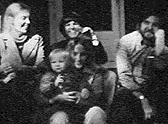Rousing Sendoff for Bari at Memorial Party
by Nicholas Wilson

Rousing Sendoff for Bari at Memorial Partyby Nicholas Wilson
|

|
|
The life and death
of Judi Bari was honored March 9 as a thousand people gathered in her hometown of Willits, California, to remember the well-known environmental and social justice leader who died seven days earlier. The "party," as she wanted it called, began in Recreation Grove Park on a sunny, breezy Sunday afternoon. Food was shared, musicians played, words were spoken, as Bari's family, friends and colleagues comforted one another with remembrances of an exceptional woman.
Bari's parents Arthur and Ruth Bari of Maryland were there, along with sisters Martha Bari and Gina Kolata. Bari's daughter Lisa was master of ceremonies of the early part of the program on a band shell stage. Others present included former Representative Dan Hamburg and Earth First! co-founder Mike Roselle. As dusk approached, a kilted bagpiper and a contingent of hand drummers led a procession several blocks to the Willits Community Center, where food was served and the program continued with music, speakers and slide shows.
| |
|
Earlier a statement
was read to the memorial from Mumia Abu Jamal, the former Black Panther and Philadelphia public radio commentator sentenced to death for allegedly killing a policeman. Bari had long supported him in his continuing efforts to present exonerating evidence, and spoke of him as a political prisoner and a fellow victim of government repression. A witness against him at trial now swears she was blackmailed by police into giving false testimony against him.
Among the speakers was Art Harwood, who said, "I guess I'm the first sawmill manager to speak today." He said he admired the public Judi Bari, the one who organized and led large nonviolent rallies and demonstrations, but even more he admired the private Judi Bari, the one he met with in small groups to discuss ways to prevent violence during 1990's Redwood Summer. Harwood said "A lot of people in the logging and sawmill business respected Judi. If she said she would do something, she did it. She never ever misled or lied to me."
| |
|
One speaker
brought out the story of Bari's early adult life in Maryland. Walt Penney met her at an anti-war rally in 1971 and immediately bonded with her. They lived as a unit for most of that decade, sharing space in a "hippie house" they called Buffalo House near the University of Maryland. He recalled how Bari efficiently organized the sharing of housekeeping chores, enabling the group house to continue for nearly a decade while many others disintegrated.
Penney said that being young, they were hungry for knowledge, so they read the classics: Engels, Marx, and Mao, followed by Philip Foner's four-volume "A History of the Labor Movement in the United States," where she learned about the I.W.W. or Wobblies.
 He said he and Bari and some of their housemates decided to learn self-defense, and enrolled in a Karate course. Bari went on to earn a black belt, and spent several summers as an invited guest at a Karate camp, breaking barriers of both age and culture. Penney remembered how Bari liked to argue and debate, and felt she could out-argue anyone. She liked to say that if challenged to a duel, her choice of weapons would be words at 10 paces. Penney recalled Bari's flair for slogans. President Nixon had just mined North Vietnam's Haiphong Harbor. During the first thaw in relations with China there was "ping-pong diplomacy," and a Chinese ping-pong team gave an exhibition at the university. Tricia Nixon was a guest at the ping-pong match. Bari and her colleagues stood up in the bleachers with a "huge" North Vietnamese flag and chanted: "Tricia Nixon likes ping-pong, while her father bombs Haiphong." After Bari dropped out in 1972 during her fifth year at the university, she and others from Buffalo House went to work for a large food chain as clerks, at that time a well-paying union job. Bari immediately got involved in the union, running for office and being made shop steward in 1973. A strike she called resulted in 10,000 workers walking off the job. Later Bari passed a physical test to qualify as a mail handler at the Washington Bulk Mail Center. Though only five feet tall, she was able to lift and shoulder a 70 lb. mailbag, breaking a barrier that had kept women out of that job. There she continued her union activity, in 1978 putting out a periodical flyer captioned "Postal Strife," a parody of the official "Postal Life." She led a successful wildcat strike for better working conditions.
| |
|
Following Penney
on the stage was Bari's friend Peg Millet, an acappela singer and one of the Arizona Four Earth First!ers targeted by an FBI sting code-named Operation Thermcon. At the memorial she sang both solo and in duet with Alicia Littletree, Bari's close friend and assistant. In the late '80s two FBI undercover operatives spent over a year infiltrating the small Arizona group, trying to steer them into using the incendiary explosive thermite, and offering to provide it. The activists refused to get involved with explosives but were persuaded to try using welding torches to take down a ski lift tower encroaching on a mountain sacred to Native Americans. The trap was sprung and the four served prison time after a plea bargain cut short their trial. During trial it came out that the FBI's mission in Operation Thermcon was to send a political message by ensnaring Earth First! co-founder and spokesman Dave Foreman in a manufactured conspiracy to use explosives.
Next Bari's former Earth First! organizing and musical partner Darryl Cherney joined rock recording artist Jello Biafra on stage to sing "You Can't Clearcut Your Way to Heaven." The two then sang Cherney's epic "Who Bombed Judi Bari?" while a slide show flashed photos of angry pro-timber demonstrators threatening violence, a death threat consisting of a newspaper photo of Bari with gun sight crosshairs drawn over her face, Bari in a hospital bed with her two young daughters beside her, a police spokesman's face, a support rally outside the San Francisco Federal Building, and many more. One of the most popular and entertaining highlights of the evening was a slide show presented by Martha Bari, who spiced the show with humorous anecdotes as she showed a pictorial history of her older sister, Judi. Arthur Bari had been an avid amateur photographer, and made many portraits and snapshots of his three daughters. Beginning with Judi Bari's first baby picture, the sequence continued through her childhood, high school, college, and her period as a blue collar worker and union organizer. A photo of baby Judi in a wooden-barred playpen flashed on the screen as Martha Bari said, "I thought I'd show Judi in her first lockup."
Other slides showed Bari's labor organizing period, including a cartoon from the union newsletter Bari put out, and a union election campaign brochure stating:
"Judi Bari has been fighting for the rank and file since she started working for Grand Union in 1972. Martha Bari told of the "really clever" way the union finally got rid of Judi. "They transferred her to a department store cosmetic counter. Ladies would come up and say 'Can you help me do something about my face?' And Judi would say 'No.' (sustained audience laughter) Needless to say she was fired."
The slide show ended with a poignant photo showing Judi Bari smiling and waving goodbye to her family as she drove away to California and all that was to follow in the life of a truly remarkable and memorable woman.
 |
Historical photos from Marth Bari's slide show at Judi Bari Memorial (3/9/97) and taken from video by Nicholas Wilson
Albion Monitor March 17, 1997 (http://www.monitor.net/monitor)
All Rights Reserved.
Contact rights@monitor.net for permission to reproduce.
